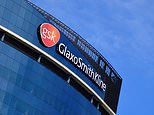GlaxoSmithKline moves another step closer to finally getting a Covid vaccine
GlaxoSmithKline moves another step closer to finally getting a Covid vaccine approved as drug giant starts phase three trials of jab
The trials will involve 4,000 people from several countries including South KoreaThe vaccine candidate will be compared against the AstraZeneca shotBritain has not ordered doses of this Covid vaccine from GSK and SK Bioscience
<!–
<!–
<!–<!–
<!–
(function (src, d, tag){
var s = d.createElement(tag), prev = d.getElementsByTagName(tag)[0];
s.src = src;
prev.parentNode.insertBefore(s, prev);
}(“https://www.dailymail.co.uk/static/gunther/1.17.0/async_bundle–.js”, document, “script”));
<!–
DM.loadCSS(“https://www.dailymail.co.uk/static/gunther/gunther-2159/video_bundle–.css”);
<!–
A Covid vaccine developed by pharmaceutical giant GlaxoSmithKline has entered phase three trials.
The British-based company, alongside its South Korean partner firm SK Bioscience, will test the jab on 4,000 people in several countries.
Their vaccine — dubbed GBP510 — will also be compared against the AstraZeneca jab.
If the jab is proven to be safe as well as prevent infection, hospitalisation and death, then it could be approved.
Both firms involved hope to supply poorer nations from 2022, through the World Health Organization’s Covax scheme.
Early clinical tests found the vaccine sparked Covid-destroying antibodies in every volunteer who received the jab.
Britain has ordered no doses of this vaccine, but it did order 60million doses of the Covid vaccine by GSK and French pharmaceutical company Sanofi.
GSK — one of the largest vaccine makers in the world — is also developing a ‘next generation’ mRNA Covid vaccine with Germany company CureVac.
GlaxoSmithKline has started the late-stage trial of its Covid-19 vaccine candidate with South Korean firm SK Bioscience (Andy Buchanan/PA)
No10’s chief scientific advisor Patrick Vallance was previously head of research and development at GSK.
England’s deputy chief medical officer Jonathan Van-Tam was also once a consultant for the London-based company.
Phase three trials are the final stage of evaluation that any vaccine must go through before it can be rolled out to the public.
Medical regulators use the data to determine whether a vaccine is safe and effective at stopping infection, hospitalisation and death from a virus.
GSK and SK Bioscience’s vaccine uses Covid antigens — the spike protein the virus uses to invade cells — made by bacteria or yeast.
In the jab these have been mixed with an adjuvant mixture, which scientists say will spark a stronger Covid response.
GSK also says the adjuvant technology may reduce the amount of vaccine protein needed per dose, allowing more supplies to be made.
The AstraZeneca vaccine uses a weakened cold virus that has Covid antigens attached to its surface.
Results from the phase three trials are expected no later than June next year.
But the trials may be blocked on ethical grounds in countries where a safe and effective Covid vaccine is already available.
Thomas Breuer, chief global health officer, GSK, said: ‘While many countries have made good progress with vaccination, there remains a need for accessible and affordable Covid-19 vaccines to ensure equitable access and to protect people across the world.
‘We are pleased to contribute with GSK’s pandemic adjuvant and to be working with SK to deliver the vaccine at scale via Covax if it is approved.’
SK Bioscience chief executive Jaeyong Ahn said: ‘We are grateful that we were able to advance to the Phase three study with the unprecedented support of global initiatives, including GSK, Coalition for Epidemic Preparedness Initiative, and the Bill & Melinda Gates Foundation.
‘Taking this important step towards overcoming the global pandemic situation, SK and GSK will bring our technical expertise together for the development of an adjuvanted protein-based vaccine candidate, GBP510.’
GSK has already committed to manufacturing up to a billion doses of its vaccine with CureVac, which entered stage three trials in December. Results are expected to be announced later this year.
Their study is one of the first to compare two Covid vaccines.
In April, Valneva launched a trial to compare its Covid jab to the one developed by AstraZeneca and Oxford University.
More than 48million first doses of the Covid vaccine have been rolled out in the UK, reaching almost 90 per cent of over-16s. And nearly 80 per cent have got two doses.
South Korea’s roll-out has been more lethargic, with around 30 per cent of people having received both doses so far.
![]()


